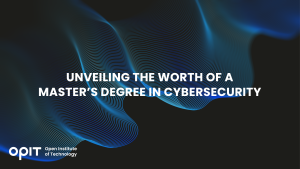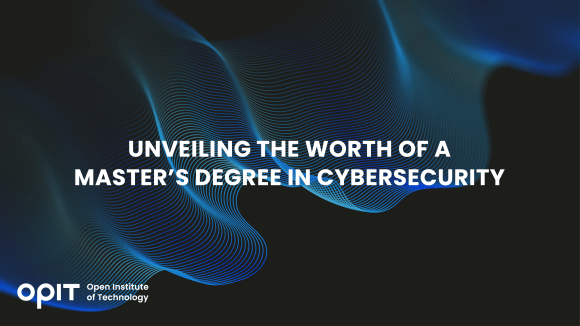

The digital landscape is evolving rapidly, and with so many facets of life moving online, cyber attackers are finding more lucrative ways to exploit them. As such, cybersecurity is more vital than ever before, and the need for professionals in this field will only increase.
So, if you’re wondering, “Is a master’s in cybersecurity worth it?” the short answer is “yes.” For the long answer, read on and learn more about this degree, career paths, and potential challenges in this field of study.
Understanding a Master’s Degree in Cybersecurity
Let’s break down what a cybersecurity degree entails. This degree is the training polygon for the highly sought-after cyber guardians. You’ll learn the art of threat assessment, network security, information assurance, and incident response.
But how difficult is a cyber security degree? It can be challenging but gratifying. The program is structured into rigorous courses that cover the technical aspects of networking, computer science, cryptography, and ethical hacking, along with the big-picture strategies of cybersecurity. The slight learning curve is justified, considering that your job will be to protect sensitive data and vulnerable individuals in the digital sphere.
Analyzing the Degree’s Worth
“Is a master’s degree in cyber security worth it?” Even though the field gets considerable hype, you might still have concerns about the return on investment (ROI). After all, a seemingly lucrative field might not give as much back as you’d hope if it’s overly saturated.
First, jobs with cybersecurity degrees are plentiful, with something for everyone. Businesses, government agencies, and non-profits are on the lookout for cybersecurity professionals who can protect their networks, data, employees, and clients.
Salary potential is equally as solid. A master’s degree in cybersecurity lets you make a grand entrance into the job market. Since professionals are in high demand and the curriculum is challenging, companies are willing to pay handsomely for skilled individuals who can protect their digital assets.
As long as the digital world keeps expanding, so does the need for cybersecurity experts. It’s a field where job security is as solid as the encryption protocols you’ll learn to master. Industries across the board, from finance to healthcare, need experts who can fend off cyber threats, making this degree a passport to a world of opportunities.
Career Pathways With a Cybersecurity Degree
“What can you do with a cybersecurity degree?” is a legitimate and fairly common question. But there are no one-size-fits-all answers here because the field’s career paths are nearly limitless. Below are some examples of potential career paths you can take with this degree.
Cybersecurity Analyst
As a cybersecurity analyst, you will be on the front lines of networks and IT systems as you scour for breaches and threats. Your primary job is to make sure that threats stay out and all data stays safe.
Information Security Manager
As an information security manager, you will have to strategize, oversee security operations, and keep your company’s secrets safe. It’s a role that demands respect and makes a difference for major players in business and governance.
Cybersecurity Consultant
As a consultant, you will be switching from project to project as you offer wisdom on how to ramp up security. You will be the one to guide businesses through digital threats.
Chief Information Security Officer (CISO)
As a Chief Information Security Officer (CISO), you are at the very top of the cybersecurity hierarchy. You’ll have a bird’s-eye view of the cybersecurity landscape, make critical decisions, and lead your organization’s digital defense strategy. It’s a role that’s as prestigious as it sounds.
The Challenges and Rewards of Studying Cybersecurity
The ascent comes with a fair share of steep climbs. The first challenge shows in a slew of technical skills, from coding to network architecture. Cybersecurity specialists also must keep pace with cyber threats that evolve faster than many users can keep up with them.
However, the field is also rewarding. When you hone problem-solving skills, you will tackle innovative projects that push the boundaries of what’s possible, turning theoretical knowledge into real-world deeds. You are the defender of nefarious threats, protecting not just bits and bytes but real people’s lives and livelihoods.
The rewards of a cybersecurity degree stretch far beyond the diploma. The degree means that you are building a toolkit for a meaningful career where, every day, you’re making a tangible difference. The impact of your work echoes far and wide as you patch vulnerabilities and outsmart the latest malware.
OPIT’s Master’s Degree in Cybersecurity
OPIT’s Master’s Degree in Enterprise Cybersecurity covers cybersecurity from beginning to end, starting with the bedrock principles and moving to the cutting-edge techniques that are shaping the future of digital defense. It is in lockstep with industry certifications and real-world scenarios, so you will not be learning in a vacuum or be limited to theory.
OPIT connects you with a cadre of expert faculty with extensive experience, gives you a supportive learning environment, and has hands-on projects that put theory into action. With all these benefits, concerns about the degree’s difficulty will soon melt away.
Choosing OPIT’s program gives you a strategic edge in the highly intense and seemingly chaotic cyber sphere. The curriculum is a comprehensive launchpad for innovation that provides plenty of opportunities to get close and personal with real-world problems. Even when you’re already reaching the end of the road of learning, there’s a robust support system to help you take on the job market, like resume workshops or networking events.
The community is the crowning jewel of the OPIT deal. Stepping into OPIT’s program, you’re joining a network of passionate, like-minded individuals. It’s a place where connections are forged between servers and between real people.
Cybersecurity Is Worth the Effort
Being a cybersecurity specialist is indeed a path that comes with a fair share of challenges—late nights, complex problems, and a steep learning curve. But the rewards are high-demand careers, attractive salaries, and the satisfaction of being on the digital frontlines.
OPIT’s Master’s Degree in Enterprise Cybersecurity is a beacon for those ready to give this field a try. It boasts expert faculty, a supportive environment, and hands-on learning that bridges the gap between theory and practice. The vibrant community and networking opportunities will propel your career forward.
Have questions?
Visit our FAQ page or get in touch with us!
Write us at +39 335 576 0263
Get in touch at hello@opit.com
Talk to one of our Study Advisors
We are international
We can speak in:




